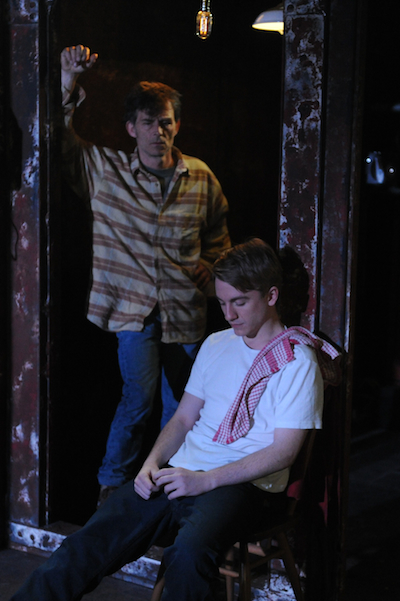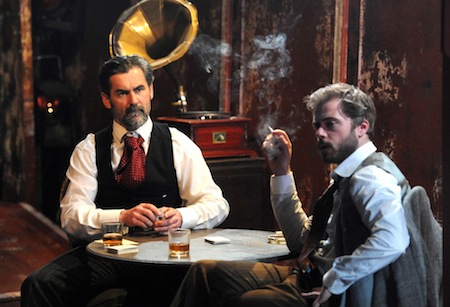Lakeboat/ Prairie du Chien, Arcola Theatre Studio 2 | reviews, news & interviews
Lakeboat/ Prairie du Chien, Arcola Theatre Studio 2
Lakeboat/ Prairie du Chien, Arcola Theatre Studio 2
Tough Chicago crewmen, violent poker on a night train - it must be David Mamet
David Mamet plays can, nearly always, be relied upon to be muscular. Leastways, when you think about his early signature plays – American Buffalo (1975), Sexual Perversity in Chicago (1976) and the Pulitzer award-winning Glengarry Glen Ross (1983) – the first thing that springs to mind is the manner and cadence of male speech and communication. A consistent critique of capitalism, Mamet’s early works did it by exploring masculinity and brilliantly dissecting the male psyche and the strutting aggression of men involved in scoring one over each other, be it in gambling or pulling a con. Even later work such as the provocative Oleanna (1992) setting male against female in a climate of political correctness exuded a prowling menace.
Lakeboat (1970) and Prairie du Chien (1985, but adapted from an earlier radio play) emanate from Mamet’s youthful period. Rarely seen individually and to the best of my knowledge never before played here as a double bill, this Arcola outing represents a considerable labour of love on the part of its director, Abbey Wright (a graduate of the Donmar stable and Michael Grandage tutelage amongst others), and no doubt all those aboard. A single A4 sheet stands for the programme with a rogues’ gallery of actors' mugshots being the only additional information available. All monies, I was told, have gone where of course they should, into the production, which I have to say looks terrific.
Wright herself has described the two plays as nocturnal. They are also short stories, or perhaps, more precisely, shaggy dog stories. For they lull the audience into anticipation of something more profound before dropping away and ending on something of an anti-climax. Lakeboat is perhaps the most teasing in this respect, Prairie du Chien more excitable though in hindsight, less satisfying.
Designer Helen Goddard, though, has cleverly encased the two productions in a dark ochre-burnished, textured cabin type of setting that more successfully conjures up the inner bulwarks of a ship than the railway carriages which are the supposed setting for Prairie du Chien. Certainly Goddard’s design works best for Lakeboat, the semi-autobiographical first play that Mamet ever wrote (later revised and even later turned into a film), based on his own experiences as a young college student spending his summer vacation serving aboard iron ore steamers around Chicago.
 As such, it betrays his inexperience in being conventionally undramatic - there is no particular narrative. However in interview Mamet has commented how, for him, drama is all about action – action which arises precisely from characters wanting something from each other. Here, the snatches of conversation that make up Lakeboat’s 50 minutes show the crewmen wanting a variety of things – sometimes nothing more heady than an egg sandwich, but underneath it is more often camaraderie or acceptance. At its most antagonistic, it is one-upmanship.
As such, it betrays his inexperience in being conventionally undramatic - there is no particular narrative. However in interview Mamet has commented how, for him, drama is all about action – action which arises precisely from characters wanting something from each other. Here, the snatches of conversation that make up Lakeboat’s 50 minutes show the crewmen wanting a variety of things – sometimes nothing more heady than an egg sandwich, but underneath it is more often camaraderie or acceptance. At its most antagonistic, it is one-upmanship.
A precociously swaggering portrait of crew members in all their argumentative, boastful iridescence, Lakeboat rests on a precariously slender conceit of the rumoured demise of the predecessor of Mamet’s alter ego, young Dale (Steven Webb) having been mugged on shore by his date for the night and dumped in a canal. In the event, it proves otherwise but not before Rory Keenan’s Fred and Nigel Whitmey’s Stan have crossed swords over various movie tough guys, Fred has bragged about his sexual prowess with women - "the way to get laid is to treat them like shit" – Nigel Cooke’s Joe has confided how old and ill he is feeling and pronounced enigmatically to Dale, "Son, you’ve got it made." (Cooke and Webb pictured above.)
Lakeboat’s macho environment captures a strange poignancy, beautifully caught by Wright’s hand-picked cast. I particularly liked Chris Jarman, under-used but compelling as Pierman introducing Dale to the rumour of his predecessor’s ruin at the beginning. In the shorter, 25-minute Prairie du Chien, the claustrophobia that should be induced by juxtapositions on a night train of two violent outbursts - an increasingly heated game of poker and a storyteller’s ghost-inflected yarn of rural infidelity and murderous race-related revenge - fails to register as strongly as it should.
Sporting waistcoats and wreathed in cigar smoke, our gambling fellas (Whitmey and Keenan again, pictured below) look for all the world as though they’ve walked straight out of The Sting. Nigel Cooke’s Storyteller, too, carries a suitable air of mystery in long, dark coat and hat. But mistakenly, for my money, Wright and her lighting designer, Emma Chapman, choose to keep the lighting at full tilt. Nor does the usually dependable Cooke embrace the tensions of his story with sufficient weight.

However, Wright’s production does contain one spectacular coup de théâtre which I’d better not divulge. Suffice it to say that it caused real shrieks from those sitting directly in the line of fire.
Lakeboat and Prairie du Chien may not be two of Mamet’s finest - they feel more like a limbering up or flexing of certain muscles - but in both, the dialogue is unmistakable: taut, cryptic, punchy and colloquially eloquent. In both, too, you can sense Mamet creating worlds not only of working reality but the gap between dreams and fantasy.
How much of the Storyteller’s tale of the farmer who went and shot his wife, burned down his own barn and was psychologically scarred for life ever after, was even true? How much of the gin-drinking gambler’s suspicions are due to his own inner paranoias? And how much of the bragging of alcoholic consumption, womanising and gun worship falls far short of the men’s real lives? Intriguing, detailed and lovingly staged, in the final analysis, it’s a double bill that for this viewer left her admiring but largely untouched.
- Lakeboat & Prairie du Chien continue at the Arcola Theatre, Dalston, London to 7 May
- Read other Arcola Theatre production reviews on theartsdesk
more Theatre
 Banging Denmark, Finborough Theatre review - lively but confusing comedy of modern manners
Superb cast deliver Van Badham's anti-incel barbs and feminist wit with gusto
Banging Denmark, Finborough Theatre review - lively but confusing comedy of modern manners
Superb cast deliver Van Badham's anti-incel barbs and feminist wit with gusto
 London Tide, National Theatre review - haunting moody river blues
New play-with-songs version of Dickens’s 'Our Mutual Friend' is a panoramic Victori-noir
London Tide, National Theatre review - haunting moody river blues
New play-with-songs version of Dickens’s 'Our Mutual Friend' is a panoramic Victori-noir
 Machinal, The Old Vic review - note-perfect pity and terror
Sophie Treadwell's 1928 hard hitter gets full musical and choreographic treatment
Machinal, The Old Vic review - note-perfect pity and terror
Sophie Treadwell's 1928 hard hitter gets full musical and choreographic treatment
 An Actor Convalescing in Devon, Hampstead Theatre review - old school actor tells old school stories
Fact emerges skilfully repackaged as fiction in an affecting solo show by Richard Nelson
An Actor Convalescing in Devon, Hampstead Theatre review - old school actor tells old school stories
Fact emerges skilfully repackaged as fiction in an affecting solo show by Richard Nelson
 The Comeuppance, Almeida Theatre review - remembering high-school high jinks
Latest from American penman Branden Jacobs-Jenkins is less than the sum of its parts
The Comeuppance, Almeida Theatre review - remembering high-school high jinks
Latest from American penman Branden Jacobs-Jenkins is less than the sum of its parts
 Richard, My Richard, Theatre Royal Bury St Edmund's review - too much history, not enough drama
Philippa Gregory’s first play tries to exonerate Richard III, with mixed results
Richard, My Richard, Theatre Royal Bury St Edmund's review - too much history, not enough drama
Philippa Gregory’s first play tries to exonerate Richard III, with mixed results
 Player Kings, Noel Coward Theatre review - inventive showcase for a peerless theatrical knight
Ian McKellen's Falstaff thrives in Robert Icke's entertaining remix of the Henry IV plays
Player Kings, Noel Coward Theatre review - inventive showcase for a peerless theatrical knight
Ian McKellen's Falstaff thrives in Robert Icke's entertaining remix of the Henry IV plays
 Cassie and the Lights, Southwark Playhouse review - powerful, affecting, beautifully acted tale of three sisters in care
Heart-rending chronicle of difficult, damaged lives that refuses to provide glib answers
Cassie and the Lights, Southwark Playhouse review - powerful, affecting, beautifully acted tale of three sisters in care
Heart-rending chronicle of difficult, damaged lives that refuses to provide glib answers
 Gunter, Royal Court review - jolly tale of witchcraft and misogyny
A five-women team spell out a feminist message with humour and strong singing
Gunter, Royal Court review - jolly tale of witchcraft and misogyny
A five-women team spell out a feminist message with humour and strong singing
 First Person: actor Paul Jesson on survival, strength, and the healing potential of art
Olivier Award-winner explains how Richard Nelson came to write a solo play for him
First Person: actor Paul Jesson on survival, strength, and the healing potential of art
Olivier Award-winner explains how Richard Nelson came to write a solo play for him
 Underdog: the Other, Other Brontë, National Theatre review - enjoyably comic if caricatured sibling rivalry
Gemma Whelan discovers a mean streak under Charlotte's respectable bonnet
Underdog: the Other, Other Brontë, National Theatre review - enjoyably comic if caricatured sibling rivalry
Gemma Whelan discovers a mean streak under Charlotte's respectable bonnet
 Long Day's Journey Into Night, Wyndham's Theatre review - O'Neill masterwork is once again driven by its Mary
Patricia Clarkson powers the latest iteration of this great, grievous American drama
Long Day's Journey Into Night, Wyndham's Theatre review - O'Neill masterwork is once again driven by its Mary
Patricia Clarkson powers the latest iteration of this great, grievous American drama

Add comment